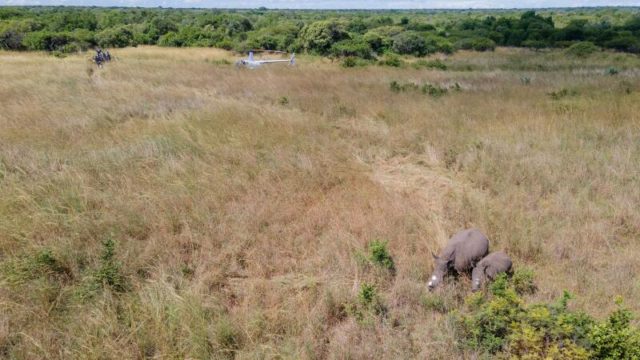The increase in poaching over the past few months has impacted rhino populations across South Africa. In 2021, the number of rhinos killed by poachers rose by a staggering 14% to 451.
DURBAN – A private game reserve, Phinda Private Game Reserve, has escalated its dehorning efforts to enhance the safety and protection of rhinos.
Phinda assistant reserve manager Dale Wapender said that while rhino dehorning was not a “silver bullet”, it was paying dividends as the brutal poaching of rhino horn has been substantially reduced in the park.
“Before we started dehorning our rhinos, we used to lose one to two of these magnificent animals every month to poachers. Now more than 99% of our rhino population has been dehorned which not only protects them against poaching, it has also played a significant role in decreasing fatalities when bulls fight for territory,” Wapender said.
He said that traditionally rhino horns have been smuggled to Asia where they are manufactured into a range of illegal medicinal products. More recently though, they have come to be viewed as a status symbol for success and wealth and being gifted a rhino horn is a way to secure favours from those in power.
“Despite the horrific increase in poaching, dehorning rhinos remains the best way to protect these animals. It’s not something that many of us love or that these gentle giants choose, but it has little or no effect on the rhino and has proven to reduce poaching,” explained Wapender.
He added that the horn was made of keratin so removing it is similar to cutting nails or hair. But just like nails, the horn re-grows so it has to be trimmed every 18 to 24 months. And, to remove the horns is an expensive process.
Wapender and his team dart the rhino from a helicopter and once the animal is sedated, it’s over to Dr Mike Toft, who uses an electric chainsaw to remove the horn and shave the excess so that only a small stub remains.
Veterinarian and rhino dehorning specialist Dr Mike Toft who heads up the Zululand Wildlife Treatment Centre, has been at the front line of rhino dehorning efforts for many years. He says that due to the financial impact of Covid, rhino dehorning slowed down in both private game reserves as well as in South African National Parks, and fortunately so did poaching.
However, this was no longer the case.
The increase in poaching over the past few months has impacted rhino populations across South Africa. In 2021, the number of rhinos killed by poachers rose by a staggering 14% to 451. This is the first time in seven years that there has been an increase in illegal rhino killings and it was believed this was driven by the lifting of lockdown restrictions.
“It’s safe to say that poaching is back with a vengeance and together with Wapender and his team at Phinda we are working around the clock to catch up, dehorning up to 20 rhinos a day,” Toft said.
He said dehorning this many rhinos could only be achieved with the right tools and he was grateful to Husqvarna for their donation of a battery-operated chainsaw and leaf blower, both of which have been more than a match for the tough working conditions.
“Though quiet, the battery-operated chainsaw is incredibly powerful and very versatile. In the past, if I was dehorning a cow and her calf, I would have to use two different chainsaws but now I can use the same tool on both animals. This is a huge plus as it reduces the time we need to keep them sedated,” Toft said.
“We use the leaf blower to keep the rhinos cool after they have been darted and I was pleasantly surprised at how light, powerful and easy-to-use the Husqvarna leaf blower was.”
Husqvarna first became involved with rhino dehorning in 2020 as part of its drive for sustainability and its commitment to those who shape and preserve the world around us.
Husqvarna veld management specialist Divan Vermaak said that includes critical conservation efforts.
“We believe that it’s essential to introduce local solutions to local problems and by donating equipment that helps with rhino dehorning, we can, in some small way, support the incredible efforts that are being made to protect and conserve South Africa’s wildlife,” Vermaak said.
Over the weekend, KZN Department of Economic Development, Tourism and Environmental Affairs MEC Ravi Pillay said: “A total of 93 rhinos were poached in KwaZulu-Natal parks in 2020, and 102 were poached last year. Since January this year, 106 rhinos have been poached, indicating a severe syndicated operation and brazenness level.”
Pillay said that while the security forces were responding and the increased number of rangers deployed, they were mindful that it is only provincial, national and international co-ordinated responses that will have a long-term effect.








